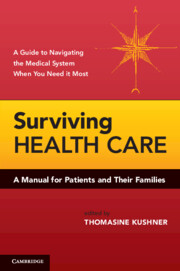Book contents
- Frontmatter
- Contents
- Contributors
- Preface
- 1 Letter to Patients
- 2 Becoming an Active Member of Your Health Care Team
- 3 Information That Will Help You with Advance Planning for Your Health Care
- 4 Responding to Medical Emergencies
- 5 What You Need to Know about Medical Errors
- 6 Being Informed When You Give Consent to Medical Care
- 7 Beware of Scorecards
- 8 Transplantation 101
- 9 When the Illness Is Psychiatric
- 10 On the Horizon
- 11 To Be or Not to Be – A Research Subject
- 12 Information That Will Help You Make Health Care Decisions for Adult Family Members
- 13 Caring for Individuals with Alzheimer's Disease
- 14 When the Patient Is a Child
- 15 Care of Elders
- 16 Being and Thinking
- 17 A Patient's Guide to Pain Management
- 18 The Hardest Decisions
- 19 What You Need to Know about Disasters
- 20 Making the Internet Work for You
- Appendix: Patient Individual Profile
- Index
12 - Information That Will Help You Make Health Care Decisions for Adult Family Members
Published online by Cambridge University Press: 05 June 2012
- Frontmatter
- Contents
- Contributors
- Preface
- 1 Letter to Patients
- 2 Becoming an Active Member of Your Health Care Team
- 3 Information That Will Help You with Advance Planning for Your Health Care
- 4 Responding to Medical Emergencies
- 5 What You Need to Know about Medical Errors
- 6 Being Informed When You Give Consent to Medical Care
- 7 Beware of Scorecards
- 8 Transplantation 101
- 9 When the Illness Is Psychiatric
- 10 On the Horizon
- 11 To Be or Not to Be – A Research Subject
- 12 Information That Will Help You Make Health Care Decisions for Adult Family Members
- 13 Caring for Individuals with Alzheimer's Disease
- 14 When the Patient Is a Child
- 15 Care of Elders
- 16 Being and Thinking
- 17 A Patient's Guide to Pain Management
- 18 The Hardest Decisions
- 19 What You Need to Know about Disasters
- 20 Making the Internet Work for You
- Appendix: Patient Individual Profile
- Index
Summary
Unlike infants and young children, adults generally have the ability to make medical decisions for themselves. Because of genetic anomalies, illness, or accidents, some children will never acquire that ability as they grow into adults, and some adults lose the ability during their lifetime. This loss of what is called decision-making capacity or competency in an adult family member may be the result of an accident; an acute medical condition, such as a stroke or heart attack; a terminal illness, such as cancer; or a chronic progressive condition, such as Alzheimer's disease, multiple sclerosis (MS), or amyotrophic lateral sclerosis (ALS, or Lou Gehrig's disease). Generally, if an adult loses decision-making capacity, one or more family members will be asked to make decisions for him or her. That person is commonly called a surrogate (or an agent, representative, or proxy).
Medical decisions for family members literally may be about life or death. However, even when they are not, they can have very serious consequences and may be fraught with anxiety, stress, and uncertainty. Nothing can completely eliminate stress from hard decisions about loved ones. Therefore, the aim of this chapter is modest; it is to provide information that will help you if and when you are called upon to be a surrogate for an adult family member. Hopefully, this information will at least reduce the stress and uncertainty you will experience if you need to make health care decisions for a relative.
- Type
- Chapter
- Information
- Surviving Health CareA Manual for Patients and Their Families, pp. 163 - 178Publisher: Cambridge University PressPrint publication year: 2010

